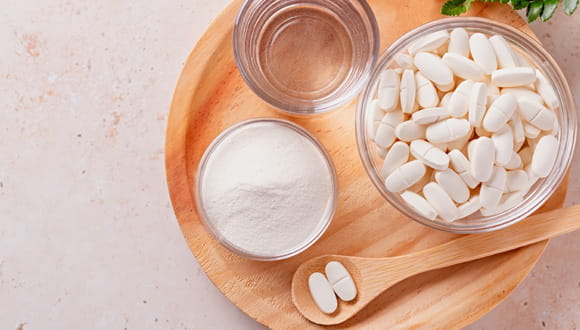Collagen Supplements: Do Collagen Peptides Really Work?
June 15, 2022 - Katie McCallumCollagen is the most plentiful protein in your body.
But the growing popularity of collagen supplements, typically referred to as collagen peptides, may have you wondering whether you need more of this protein than your body can make on its own.
As with any supplement, it's important to ask a few questions before opening your wallet and putting your health on the line.
What is collagen anyway?
Collagen is a structural protein — an important component of your connective tissue, which holds your skin, bones, muscle, ligaments and more together. The fiber-like design of collagen helps provide these important structures with not just strength but the ability to withstand stretching.
It's why bones are hard but can withstand some stress and it's why skin has elasticity but is still firm.
Like all proteins, the body makes collagen by stringing together molecules called amino acids. Some of these amino acids are made by the body itself. Others come from the protein-rich foods in your diet. Collagen, in particular, also requires vitamin C to bind the fibers together.
Unfortunately, collagen production naturally decreases with age — contributing to the signs of aging that many of us are trying to avoid, like wrinkles.
Cue collagen peptides ...
(Age isn't the only thing that affects collagen production, by the way. But more on that later.)
What are collagen peptides?
Early iterations of collagen supplements were simply topical creams containing collagen, marketed to replace lost collagen and help prevent skin aging.
But given the size of collagen — it's a fairly large molecule — experts criticized these products. Something so large likely wouldn't be absorbed into the skin or travel deep into the skin layers where it's needed.
Current collagen supplements get around the issue by hydrolyzing collagen into collagen peptides — much smaller strings of the amino acids that make up collagen. These shorter chains are more readily absorbed and can be made into powders or packaged into pills to be taken orally.
Manufacturers of collagen peptides would have you believe these supplements improve everything from wrinkles and joint pain to gut health and mood. And the celebrities who promote these products have the flawless skin, hair, body and smile to sell it.
But you're right to question whether the fountain of youth is really as simple as mixing some (pricey) powder into your morning coffee.
Do collagen peptides work?
The two most commonly proposed benefits of collagen peptides are improved skin health and reduced joint pain. But these supplements are also touted to support digestion and heart health, prevent bone loss and increase muscle mass.
Unfortunately, experts say that the research supporting all of these claims is limited.
Studies have shown that collagen peptides are absorbed by the GI tract. They've also shown that amino acid levels increase as a result, indicating that the peptides are indeed broken down and added to the available amino acid pool.
But everything beyond that is still very murky — including whether the body even uses those amino acids to produce collagen, specifically, instead of other needed proteins.
What's more, these studies are often very small (some as few as eight people) or funded by — you guessed it — the companies that make collagen supplements.
Lastly, since vitamin C is required for collagen synthesis, you'll need to be sure you're getting enough in your diet in order for collagen supplementation to have any chance of providing a benefit. (For that reason, some of the products do include vitamin C.)
The bottom line with collagen supplements is that there are still more questions than answers. Additional research is needed to prove whether the claimed benefits are actually real.
Are collagen supplements safe?
It's unclear whether collagen peptides actually help, but studies show that taking them typically doesn't cause any harm.
That said, it's always important to consult your doctor before taking any new supplement.
And, true of any supplement, know that collagen peptide products aren't regulated by the FDA — so you'll need to do some research to be sure you're getting a quality product that has undergone testing and been certified by an independent third party laboratory, such as NSF.
Lastly, stay away from any collagen supplements that include anything other than hydrolyzed collagen — especially ones that contain added sugar, an additive that provides no nutritional benefit and can harm your health when consumed in excess over time.
Are there natural ways to help your body make collagen?
The best way to ensure that your body has everything it needs to produce plenty of collagen is to eat a well-balanced diet that includes enough protein, which may increase as you age. (Related: How Much Protein Do I Need?)
This protein will be broken down into amino acids, which can then be used to make any collagen your body needs — no supplements needed. A well-balanced diet also ensures you get enough vitamin C, a required resource during collagen production.
It's also important to point out that increasing age isn't the only thing that contributes to declining collagen levels.
Before age catches up with you, certain preventable lifestyle behaviors can cause your collagen levels to drop, including:
- Excessive sun exposure
- Excessive alcohol consumption
- Smoking
- Inadequate sleep
- Lack of exercise
If you're eating healthy, avoiding the unhealthy habits above and are still worried about your collagen levels, talk to your doctor. He or she can help you understand whether joint pain or other issues may be due to low collagen and what to do next.








